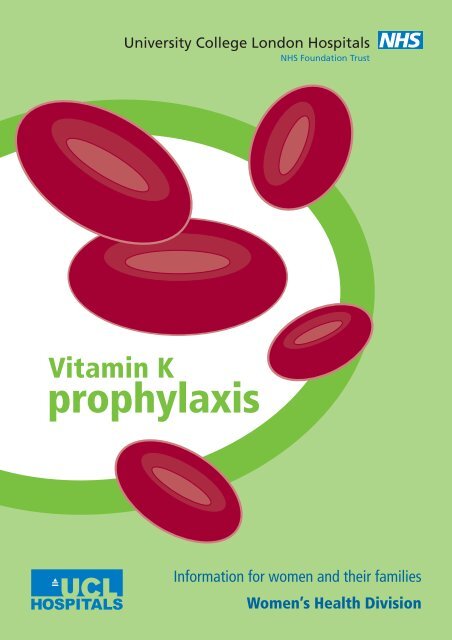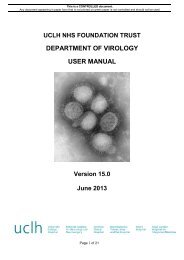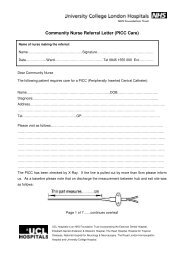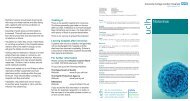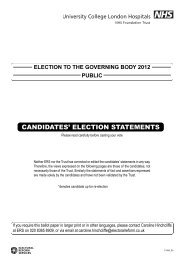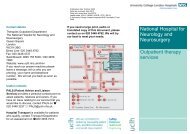Vitamin K Prophylaxis - University College London Hospitals
Vitamin K Prophylaxis - University College London Hospitals
Vitamin K Prophylaxis - University College London Hospitals
You also want an ePaper? Increase the reach of your titles
YUMPU automatically turns print PDFs into web optimized ePapers that Google loves.
<strong>Vitamin</strong> K<br />
prophylaxis<br />
Information for women and their families<br />
Women’s Health Division
The Department of<br />
Health recommends<br />
that all babies are<br />
given a vitamin K<br />
supplement at<br />
birth. This leaflet<br />
explains why.<br />
What is vitamin K?<br />
<strong>Vitamin</strong> K is a vitamin which occurs naturally in<br />
food such as green leafy vegetables, some oils<br />
such as olive oil and is made by bacteria in our<br />
large intestine. <strong>Vitamin</strong> K is required for the blood<br />
to clot properly preventing abnormal bleeding.<br />
Newborn babies commonly do not have enough<br />
vitamin K because very little is passed to the<br />
baby in the womb from its mother, breast milk<br />
only contains small amounts of vitamin K and<br />
bacterial production in the gut takes some time<br />
to be established.<br />
A small number of babies may bleed due to<br />
vitamin K deficiency. This is called haemorrhagic<br />
disease of the newborn (HDN). This risk of bleeding<br />
is effectively removed when sufficient extra<br />
vitamin K is given to babies.<br />
Haemorrhagic disease of the newborn is a disorder<br />
which occurs almost exclusively in babies who are<br />
not given vitamin K at birth. Bleeding may occur<br />
at any time for several weeks after birth. Early<br />
signs of HDN may be blood loss from the umbilicus<br />
or the gut. Rarely bleeding is more serious, the<br />
greatest concern being bleeding into the brain<br />
which can lead to brain damage or even death.<br />
What’s the risk?<br />
Between 2.5 and 17 out of every 1,000 babies<br />
who do not receive vitamin K will have some<br />
bleeding but the risk of serious bleeding is small.<br />
About 1 in 10,000 babies who do not receive<br />
vitamin K will bleed into their brain, about a third<br />
of these will suffer serious permanent brain injury<br />
or die.
This risk is virtually eliminated when your<br />
baby is given a vitamin K supplement<br />
in sufficient amounts.<br />
Why give vitamin K<br />
to all babies?<br />
Although there are groups of babies who<br />
are particularly at risk of bleeding, it is<br />
not possible to identify babies as high<br />
or low risk with absolute certainty. The<br />
range of risk factors is broad but in some<br />
babies without risk factors, bleeding<br />
occurs for unknown reasons in the first<br />
few weeks of life and of babies who<br />
suffer bleeding about a quarter have<br />
no previous risk factor.<br />
Which babies are at<br />
greatest risk?<br />
• Babies born prematurely<br />
• Babies who have had a complicated<br />
delivery e.g. a forceps delivery<br />
• Babies requiring surgery<br />
• Babies who are ill for other reasons<br />
• Babies of mothers taking certain drugs,<br />
particularly some anti-convulsants<br />
• Those who fail to take or find it hard<br />
to absorb feeds<br />
• Those having bleeding or spontaneous<br />
bruising in early infancy<br />
• Babies with liver disease, this may<br />
present as prolonged jaundice, pale<br />
stools or dark urine.<br />
Can vitamin K be harmful?<br />
Concerns about a possible link between<br />
the use of injected vitamin K and<br />
childhood cancer were raised by a study<br />
in the early 1990s. Several large studies<br />
have examined this issue. A review of<br />
data from the UK Children’s Cancer<br />
Study Group in 2003 found no evidence<br />
that neonatal vitamin K administration,<br />
irrespective of route, influences the risk<br />
of children developing leukaemia or any<br />
other cancer.<br />
How is vitamin K given?<br />
<strong>Vitamin</strong> K is usually given by intramuscular<br />
injection. This provides the most reliable<br />
and long-lasting protection. <strong>Vitamin</strong> K<br />
given orally requires three doses usually<br />
given at birth, one week and one month<br />
of age.<br />
The Department of Health recommends<br />
that if you choose to have doses of<br />
vitamin K by mouth for your baby, you<br />
need to be aware of the necessity for<br />
further doses at the agreed times. These<br />
may need to be given by your healthcare<br />
professional and it is important that you<br />
can be available for these to be given.
Recognising the warning signs of HDN<br />
Many babies who later suffer bleeding in the brain<br />
have had prior minor bleeds from the skin, nose<br />
or mouth. Any baby with unexplained bleeding or<br />
bruising requires urgent medical assessment.<br />
Any baby who is still jaundiced after two weeks of<br />
age must be seen by a doctor or health visitor.<br />
This is particularly concerning if they are not gaining<br />
weight properly, have pale stools and dark urine,<br />
or are ill in any way.<br />
If you have any questions or concerns<br />
relating to vitamin K, please do not hesitate<br />
to discuss it with your midwife or doctor.<br />
Contact details<br />
Direct tel<br />
020 7380 9400<br />
Website<br />
www.uclh.nhs.uk<br />
Where can I get more<br />
information?<br />
Please speak to your midwife<br />
or doctor. If you need a large<br />
print, audio or translated<br />
copy of this document, please<br />
contact us on 0845 155 5000<br />
ext. 9719. We will try our best<br />
to meet your needs.<br />
<strong>University</strong> <strong>College</strong> Hospital<br />
Elizabeth Garrett Anderson Wing<br />
235 Euston Road (entrance is on Grafton Way)<br />
<strong>London</strong> NW1 2BU<br />
Maternity Department Telephone: 020 7380 9400 Hospital Switchboard: 0845 155 5000<br />
Publication date: 3 December 2009 Review date: 3 December 2012


